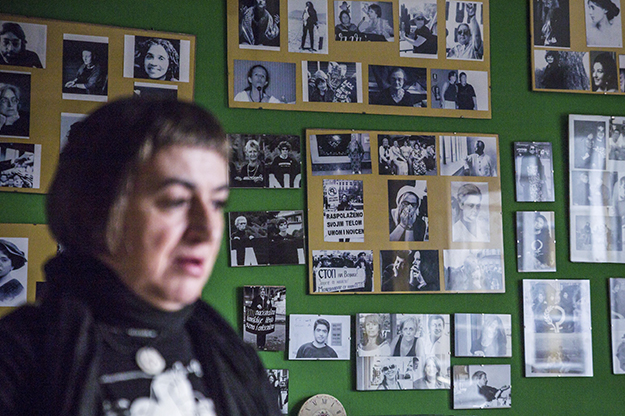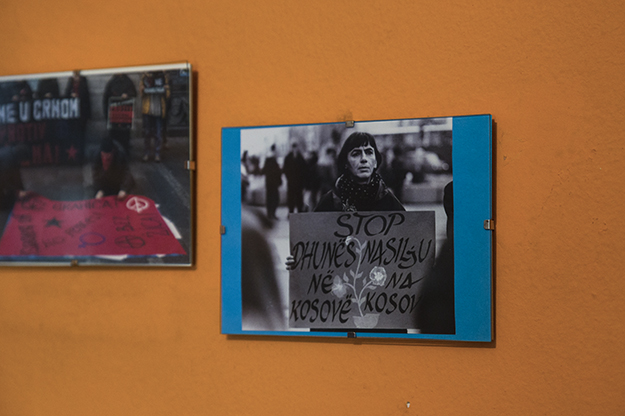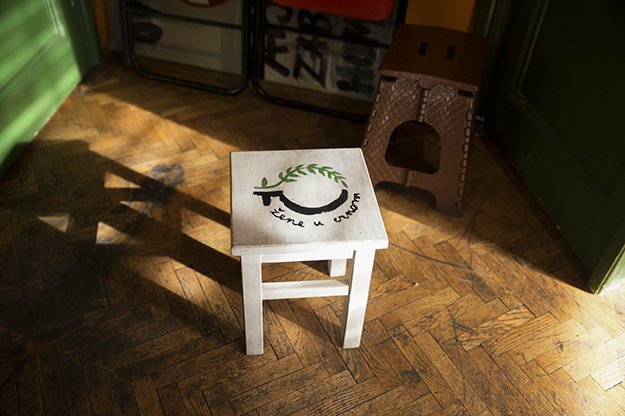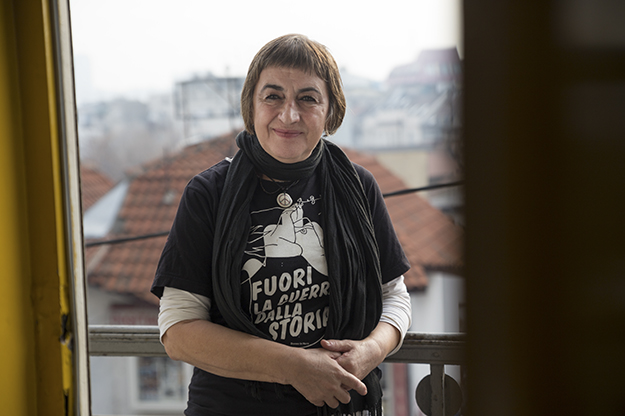For more than 30 years Staša Zajović has opposed patriarchy, warmongering policies and nationalism; traits found in societies across the region. While overcoming the obstacles she has faced along the way — and there have been many — she has refused to hold back in her activist work.
As coordinator and one of the founders of the Serbian branch of international feminist and anti-militaristic group Women in Black, the constant thread in Zajović’s activism over the years has been peaceful protests.
Women in Black has regularly reminded the Serbian public of the war crimes committed in the countries emerging from Yugoslavia. During the 1992-95 war in Bosnia and Herzegovina, they stood in the streets of Belgrade and spoke about crimes and murders committed by government supported forces; they did the same during the 1998-99 war in Kosovo. This is why in Serbia, many refer to them as the ‘most hated non-governmental organization’ by those in power and their supporters.
Zajović says that they have been living with such a label since the years of Slobodan Milošević, who systematically worked on demonizing them and other similar organizations in Serbia. According to Zajović, the current Serbian president, Aleksandar Vučić, has continued the same policy and approach.
That is why, in November this year, Women in Black announced that they would file a case in the European Court of Human Rights in Strasbourg against Vučić.
“The government in Serbia is no longer hiding that they are backing a variety of so-called patriotic, pro-fascist organizations,” said the Women in Black’s press release from November 29 this year. “Aleksandar Vučić, [Minister of Foreign Affairs] Ivica Dačić and [Minister of Defense] Aleksandar Vulin were part of the policies and government that incited, assisted, and inspired the Srebrenica genocide and many other crimes in Bosnia and Herzegovina and Croatia. They were part of the government that committed numerous crimes in Kosovo.”
Since 2015, when a large number of refugees headed for the European Union through the Balkans, Women in Black and Zajović have expressed solidarity by standing up for them, emphasizing again and again that war brings calamity to all, except for those who cause the people to leave and profit from them.
Zajović’s work has influenced many feminist groups around the globe, but it has also brought her multiple problems in Serbia, including physical assaults. One such example was the 2014 attack on Zajović and other Women in Black activists in Valjevo, Serbia, when they were en route to the annual genocide commemoration in Srebrenica.
This November, Zajović — along with other international activists — was presented with an award by the Sharia, Segregation and Secularism conference in London for her “immense contributions to the cause of women’s rights and secularism.” The conference marked 10 years of the One Law for All campaign that advocates “for equality irrespective of background, beliefs and religions.”
K2.0 spoke to Staša Zajović on World Human Rights Day, December 10, in Belgrade, where we touched upon some of the most important issues of 2018.

Photo: Lazara Marinkovic / K2.0.
K2.0: How difficult is it to be an activist and feminist in Serbia today?
Staša Zajović: In Serbia, it is generally difficult to be a free-thinking person. It is especially difficult to talk critically, clearly and publicly about this regime. One of the most painful topics in Serbia is the attitude toward war crimes and the government’s accountability, which is why the Women in Black are often targeted. Our feminist activism is, of course, part of this topic of dealing with the past.
To me, I must say, feminism is not connected to gender issues only, but the feminist approach is something I feel connected to. This means that arms export policies and attitudes toward war are two topics that concern me as a responsible citizen, because weapons produced in Serbia are used to kill other people in the Middle East and Africa.
For a quarter of a century, Women in Black have insisted on facing the past, above all in Serbia. Have we, in that sense, reached that day, bearing in mind that the same people are in power in Serbia, Croatia, and Bosnia and Herzegovina, or at least people with the same ideas that brought about the wars of the 1990s?
It has become somewhat commonplace that those who have been part of the very axis of the crime production machinery have returned to power, and that there was a misconception in the year 2000 that we could start building something new without a radical rupture.
Those of us that work with people on the ground — with the people who have gone through the terrors of war — we know that the past is the present to them, and the future to a large extent as well. I work with women from Vukovar and Srebrenica [cities in Croatia and Bosnia and Herzegovina respectively that underwent massive war destruction and crimes against civilians], and their yearning for justice has strengthened as the years pass. This is a great drama, since there are so many unprocessed war crimes and so many unacknowledged sufferings and deep traumas.
This is the present of the victims, but not only theirs; it is the present of all of us living in this country. Wherever you turn, those who exploit and those being exploited are part of the same grindstone, of the same cultural model.

Photo: Lazara Marinkovic / K2.0.
It was necessary not only to extradite those suspected of committing war crimes — as a commercial package that we sent to the Hague, while we stayed as we were — but to perform basic institutional reforms, for which it is too late now, such as lustration, opening up of criminal files, educational programs. There have been well-known models that could have been copied, but they weren’t. What we now have is a nexus of oligarchical connections between warprofeeters and criminal mafia.
Look at Vučić — he was the information minister, a sports fan, he was a [‘man of the people’] with plural identities. Whoever had any illusion that he could wash the blood off his hands has been proved terribly wrong. Some European officials thought so, too. A wolf can change his coat but not his character.
These days, again, there is noticeable disharmony between Prishtina and Belgrade. Kosovo had increased taxes on goods from Serbia and Bosnia and Herzegovina. Do you think there is political will to solve the problems between the two governments?
We may only speculate about the political games played and in which manner human needs and safety are being cared for, as well as the issue of self-determination. There are always civilians present, on both sides, victims who are used for the sake of achieving so-called national interests.




They say: ''The eyes are the mirror of the soul'' once again, they are right... So there is NO crimes against the Serbs, just the crimes that the only Serbs did.... Enjoy your western paid checks i guess you have family to feed or support (if they didn't give up on you because of your selfishness), but remember of every Serbian innocent victim's of war when you go to sleep...good night...soon you will meet your maker....or not..